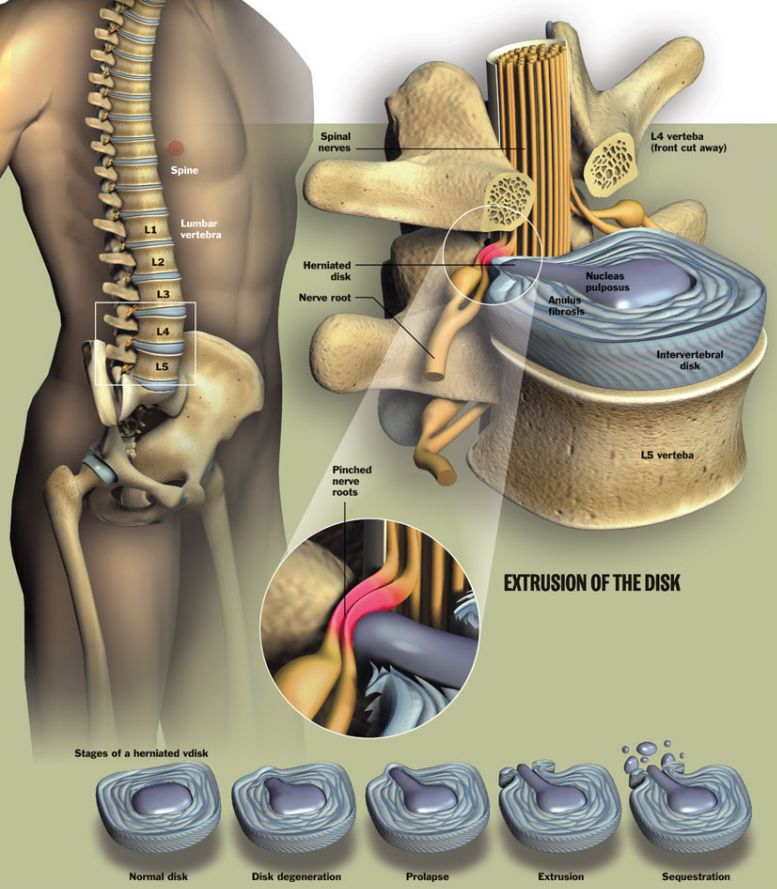Subject: Slipped Disk
- Causes, Symptoms Treatments
| Our spine is formed of bones (vertebrae) that are cushioned by discs that are small and spongy. These discs play the role of shock absorbers for the spine and keep it flexible. When this disc gets damaged, it might bulge or get ruptured. This condition is called a herniated disc or is also known as a slipped disc. While herniated discs can happen in any part of the spine, it usually affects the lower back area known as the lumbar spine. It could also happen in the neck and the upper back, but these occurrences are rare. We are about to know more about a slipped disc in the lower back area. Let us read further about what causes a herniated disc and how to prevent it. The causes of a slipped disc A slipped disc may be caused by:
What are the symptoms of a slipped disc? If a slipped disc presses and puts pressure on nerve roots, it can cause a lot of pain in the entire area of the body where the nerve traverses. If the slipped disc is in the lower back area, the most common ailment caused is Sciatica that causes pain and numbness in the entire leg starting from the buttock. Sometimes if the disc is not putting pressure on a nerve, you might experience very little pain or nothing at all. However, if you feel a numbness or mild pain in the legs accompanied by loss of control on your bladder and bowels, then see a doctor immediately. It could be because of a condition called cauda equina syndrome. Treatment for slipped disc A slipped disc cannot be cured by medication. However a combination of medication and exercises can alleviate the pain and allow the damage to be repaired. It might take anywhere between a few weeks to a few months.
A slipped disc is usually self-healing. Under rare circumstances one might have to go for surgery to correct the condition. Medication and exercise can only prevent further injury and keep the pain in check. How can a slipped disc be prevented? Once you have a slipped disc, you are prone to back problems in the future. To help your back remain injury free and healthy follow some simple tips:
Your body is a vehicle that carries you, so it helps to respect it and take good care of it. It is better to prevent a condition from occurring rather than seeking cure after damage has been done. A healthy lifestyle can go a long way in keeping you fit and your body strong Note: This article is just for the general information of the readers. For more details and guidance please contact a medical Ortho specialist doctor. |
www.keralites.net        |
__._,_.___
Posted by: prasannam n <iampresanam@yahoo.co.in>
| Reply via web post | • | Reply to sender | • | Reply to group | • | Start a New Topic | • | Messages in this topic (2) |
KERALITES - A moderated eGroup exclusively for Keralites...
To subscribe send a mail to Keralites-subscribe@yahoogroups.com.
Send your posts to Keralites@yahoogroups.com.
Send your suggestions to Keralites-owner@yahoogroups.com.
To unsubscribe send a mail to Keralites-unsubscribe@yahoogroups.com.
Homepage: http://www.keralites.net
To subscribe send a mail to Keralites-subscribe@yahoogroups.com.
Send your posts to Keralites@yahoogroups.com.
Send your suggestions to Keralites-owner@yahoogroups.com.
To unsubscribe send a mail to Keralites-unsubscribe@yahoogroups.com.
Homepage: http://www.keralites.net
.
__,_._,___

No comments:
Post a Comment